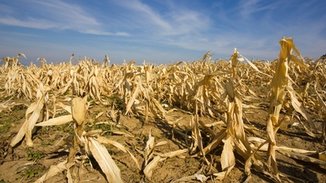Economists calculate that each degree Celsius of warming will dock the U.S. economy by 1.2 percent--and increase the divide between rich and poor. Christopher Intagliata reports.
经济学家经过计算得出结论,温度每上升一摄氏度,美国的经济就会下降1.2个百分点,并会扩大贫富差距。
撰文/播音:克里斯托弗·因塔利亚塔(Christopher Intagliata)
翻译:路识宇
审校:郭晓
In President Trump's June 1st speech withdrawing the U.S. from the Paris Climate Accord, he claimed the climate agreement was costing American workers. In a whole lot of ways: "In terms of lost jobs, lower wages, shuttered factories, and vastly diminished economic production."
总统特朗普在六月一号发表演讲,宣布美国退出巴黎气候协定。他声称气候协定使美国工人在方方面面都付出了沉重的代价,包括“失业、低薪、倒闭的工厂以及大幅下降的生产额。”
Of course, doing nothing about climate change is an option. But what is the economic price…of that choice? A team of economists and scientists set out to answer that question, by linking up economic and climate models to estimate how much warming temperatures could cost the U.S. economy.
当然,面对气候变化的现状什么都不做也是一种选择。但是做出这种选择需要付出多大的经济代价呢?几个经济学家和科学家组成了一个小组,想要通过建立一个经济-气候的模型来回答这个问题,该模型将预测出气候变暖对美国经济的影响。
And they found that for every degree Celsius the temperature goes up? It docks the U.S. gross domestic product, the GDP, by 1.2 percent.
他们发现,气温每增长一摄氏度,美国的国民生产总值(GDP)就会下降百分之一点二。
But that economic penalty will not be evenly applied. Because the southern U.S. is already much poorer than the northern U.S. today. Oh, and it's hotter, too. "You know, if you're already a really hot location, heating up is really harmful." Solomon Hsiang, an economist at UC Berkeley. "Going from 70 to 75 isn't nearly as bad as going from 90 to 95."
但是这所带来的经济损失并不是平均分配的。因为如今的美国南部已经比北部穷太多。噢,而且也更热。“你要知道,如果一个地方本身已经很热了,那么温度继续上升带来的危害就非常大。”所罗门·向说道,他是加州大学伯克利分校的一名经济学家。“温度从70华氏度增长到75华氏度远没有从90增长到95带来的危害大。”
Add in more hurricane damage, smaller crop yields, lost jobs, an increase in death and disease—and the analysis finds that climate change could eat up 20 percent of the poorest counties' income by the end of the century.
分析发现,加上飓风带来的损失、减少的作物产量、失业、死亡和疾病的增加,截止到本世纪末,气候变化消耗了最贫穷乡镇20%的收入额。
"Effectively we're harming the poorer populations and helping the wealthier northern populations. So this means climate change can actually increase inequality within the United States." The study is in the journal Science. [Solomon Hsiang et al., Estimating economic damage from climate change in the United States]
“事实上,我们正在伤害贫困群体,帮助北方富裕阶层。所以这意味着气候变化确实能加剧美国的贫富差异。”这项研究发表于《科学》(Science)杂志。
Warming temperatures probably won't help President Trump reach his forecasted three percent growth rate for the U.S. economy, either. "You know, this is essentially going to slow down the growth rate gradually." In other words: it won't be a good climate for negotiation.
特朗普总统曾许诺让美国经济增长百分之三,然而,气候变暖或许也不能帮助他达到他的预期。 “你知道,这本质上其实会逐渐减缓增长率。”换句话说:气候变化不是一个能协商的问题。
—Christopher Intagliata

 京公网安备11010502039775号
京公网安备11010502039775号  京公网安备11010502039775号
京公网安备11010502039775号 
















